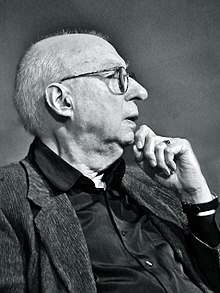Melusine (Reimann)
Melusine is a 1971 German-language opera by Aribert Reimann, on a libretto by Claus H. Henneberg after Melusine, a 1920 play in four acts by Yvan Goll which transposes the legendary water-spirit to Goll's time. The opera was written for the Schwetzingen Festival, where it premiered in 1971. It was recorded in 2010.
| Melusine | |
|---|---|
| Opera by Aribert Reimann | |
 The composer in 2010 | |
| Librettist | Claus H. Henneberg |
| Language | German |
| Based on | Melusine by Yvan Goll |
| Premiere | 29 April 1971 |
History
Melusine, Aribert Reimann's second opera, was written on the seventh commission from the Süddeutscher Rundfunk for a new opera for the Schwetzingen Festival, following for example Hans Werner Henze's Elegie für junge Liebende (1961) and Fortner's In seinem Garten liebt Don Perlimplin Belisa (1962).[1] The libretto was written in German by Claus H. Henneberg, based on a 1920 play of the same name by Yvan Goll,[2] which was again based on Mélusine, a French-language libretto written by Goll for an earlier – possibly unperformed – opera by Marcel Mihalovici in 1920.[3]
The title refers to the legendary water-spirit. Derived from French legend and later a German folk book by Thüring von Ringoltingen, the topic is transposed to modern everyday life ("modernes Alltagsleben") in France before World War I.[1][4] The main character is married to a real estate agent, but still a virgin, focused on the preservation of a local park (or forest) that she sees filled with nature spirits. She is unable to stop a castle being built on the land, a building in which she loses her virginity and dies.[2][4]
Melusine premiered at the opening of the festival Schlosstheater Schwetzingen in 1971, conducted by Reinhard Peters, staged by Rudolf Sellner, with Catherine Gayer in the title role, and Martha Mödl as Pythia.[5][1] The opera was recorded by Wergo in 2010, from a live performance at the Staatstheater Nürnberg.[2][6] A 1974 handbook on opera production notes the features of aleatoric passages, dissonances and atonality.[4] A reviewer of The Guardian described the musical language as neo-expressionist, with writing for voices in declamatory style and with demanding coloraturas.[2] A reviewer of the premiere, writing for the weekly Die Zeit, found the vocal writing for the three main characters convincing, and compared the work's expressivity to Alban Berg's Lulu and its atmosphere to Debussy's Pelleas et Melisande, noting the similarities of the three female characters.[1]
In 2016, a production by the Berlin University of the Arts, where Reimann had been a professor of contemporary Lied, honoured the composer's 80th birthday.[7]
Roles
| Role | Voice type | Premiere cast[5] 29 April 1971[8] Conductor: Reinhard Peters |
|---|---|---|
| Melusine | coloratura soprano | Catherine Gayer |
| Pythia | contralto | Martha Mödl |
| Madame Lapérouse | mezzo-soprano | Gitta Mikes |
| Oleander | tenor | Donald Grobe |
| Graf von Lusignan | baritone | Barry McDaniel |
| Surveyor | bass-baritone | Ivan Sardi |
| Mason | bass | Klaus Lang |
| Architect | tenor | Loren Driscoll |
| Oger | bass | Josef Greindl |
References
- Schwinger, Wolfram (7 May 1971). "Aribert Reimanns neue Oper in Schwetzingen uraufgeführt: Ein Stück Lulu in Melusine". Die Zeit (in German). Retrieved 7 July 2017.
- Clements, Andrew (19 August 2010). "Reimann: Melusine". The Guardian. Retrieved 7 July 2017.
- The Oxford Dictionary of Music 0199578540 2013
- Eaton, Quaintance (1974). Melusine. Opera Production II: A Handbook. University of Minnesota Press. ISBN 9780816657544.
- "Melusine 1971". Opera Scotland. Retrieved 12 September 2017.
- OCLC 699835923
- Pachl, Peter P. (11 July 2016). "Das Geheimnis exponierter Töne – Aribert Reimanns "Melusine" an der Universität der Künste Berlin". neue musikzeitung (in German). Retrieved 7 July 2017.
- "Melusine". Schott Music. Mainz. Retrieved 12 July 2019.
Further reading
- Hillerman, Anne (6 August 1972). "Composer Reimann looks forward to local 'Melusine'". The Santa Fe New Mexican. Santa Fe, New Mexico. p. 5. Retrieved 21 May 2020 – via Newspapers.com.
- "SFO to stage premiere". The Santa Fe New Mexican. Santa Fe, New Mexico. 13 August 1972. p. 66. Retrieved 21 May 2020 – via Newspapers.com.
External links
- Melusine Universität der Künste Berlin
- Peter Uehling: Oper "Melusine" Gegen die Regel verliebt Berliner Zeitung 8 July 2016
- Melusine Opera Scotland